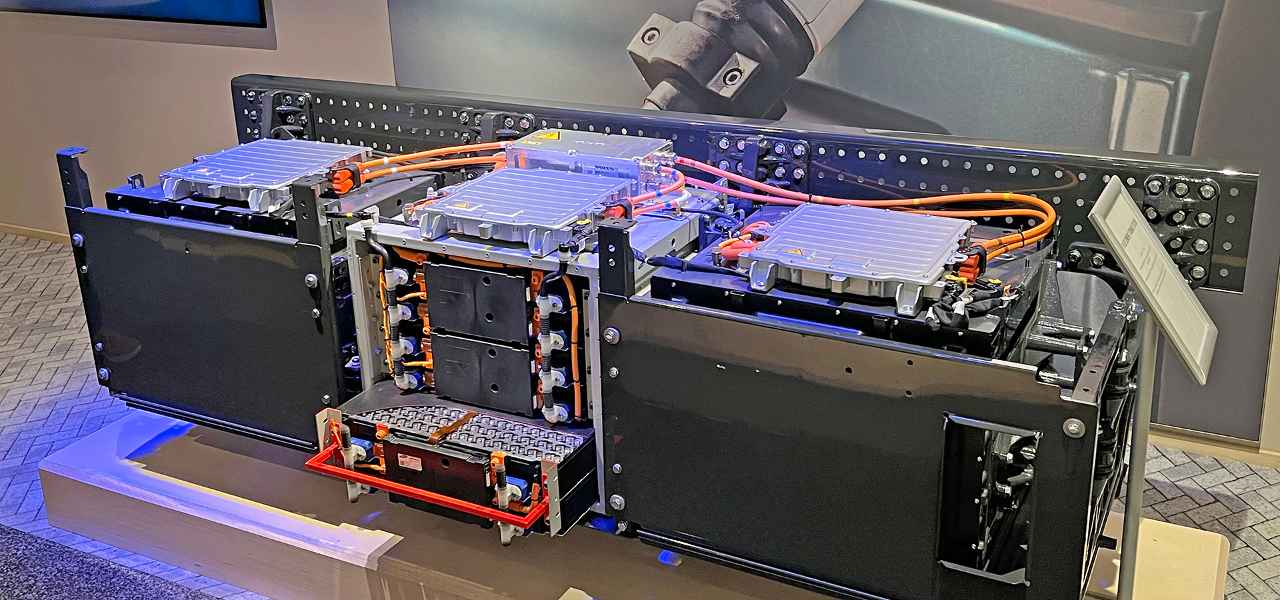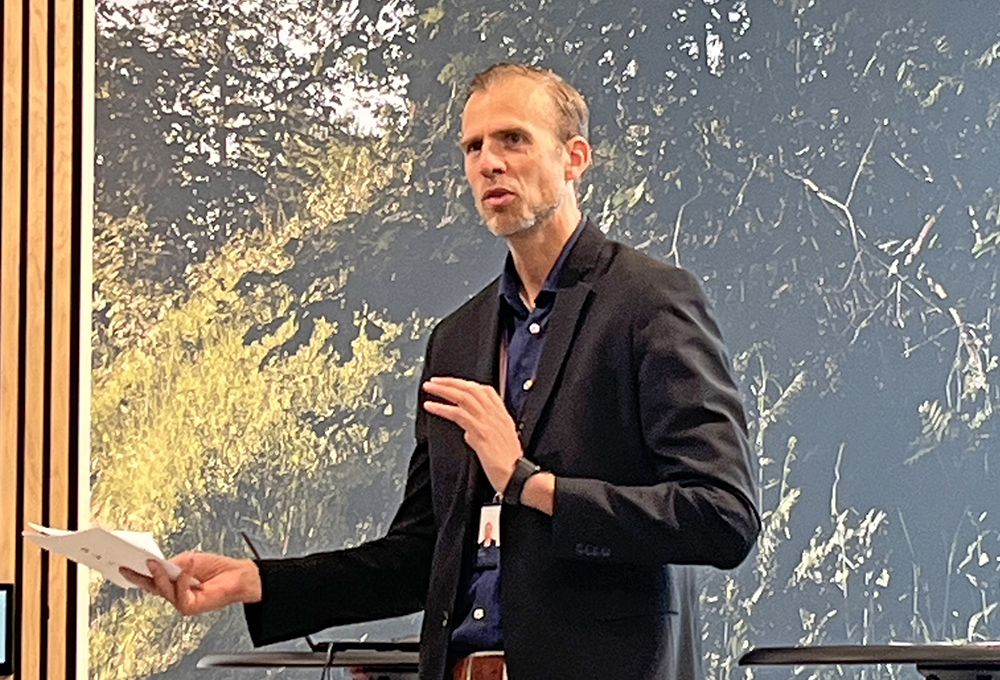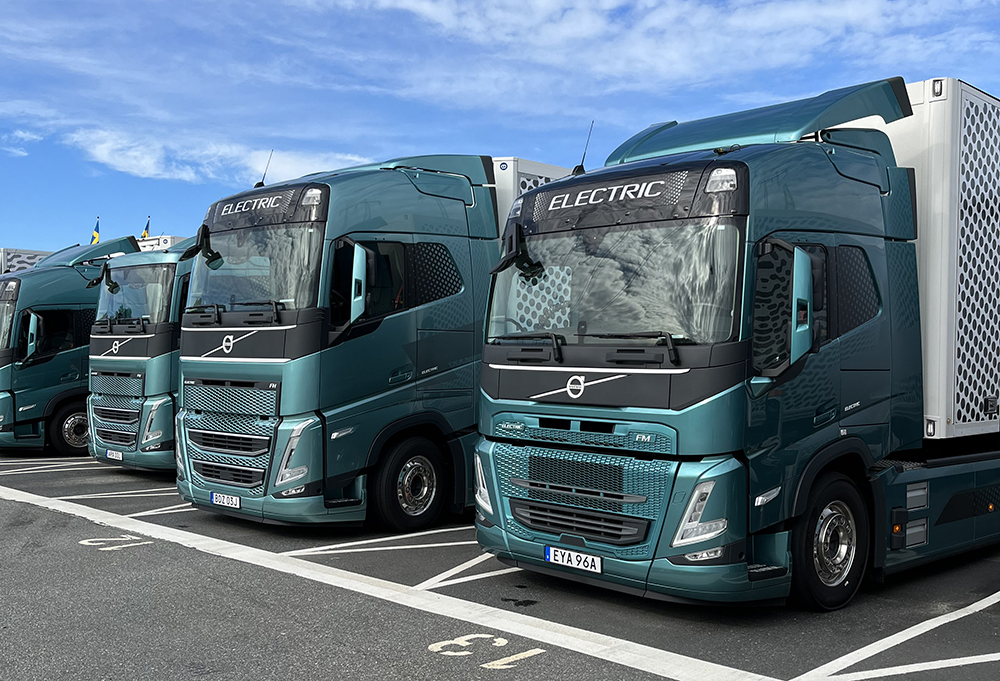 沃尔沃的储能系统包含三个电池组,每个电池组的容量为90 kWh。根据具体的续航和载重需求,客户可以在一辆卡车中配置最多六个电池组(共540 kWh)。(Ryan Gehm)
沃尔沃的储能系统包含三个电池组,每个电池组的容量为90 kWh。根据具体的续航和载重需求,客户可以在一辆卡车中配置最多六个电池组(共540 kWh)。(Ryan Gehm) 沃尔沃集团电动交通技术高级副总裁Peter Granqvist说,在电池化学成分方面,他 “不排斥任何东西”。(Ryan Gehm)
沃尔沃集团电动交通技术高级副总裁Peter Granqvist说,在电池化学成分方面,他 “不排斥任何东西”。(Ryan Gehm) 沃尔沃FH和FM重型卡车使用三星SDI提供的NCA锂离子电池。(Ryan Gehm)
沃尔沃FH和FM重型卡车使用三星SDI提供的NCA锂离子电池。(Ryan Gehm) 沃尔沃未来在瑞典马里斯塔德的 “绿色”工厂生产的电池将用于沃尔沃集团的各类产品。(沃尔沃卡车)
沃尔沃未来在瑞典马里斯塔德的 “绿色”工厂生产的电池将用于沃尔沃集团的各类产品。(沃尔沃卡车)
尽管未来的卡车动力电池技术尚待摸索,但瑞典卡车制造商沃尔沃已经选定NCA锂离子电池作为其发展路线,因为NCA具有极高的能量密度。
在戴姆勒卡车、帕卡和康明斯Accelera正与技术合作伙伴亿纬锂能开发磷酸铁锂(LFP)电池之际,沃尔沃卡车却在开发锂镍钴氧化铝(NCA)正极材料的锂离子电池。这家发端于瑞典的卡车制造商一直致力于探索与众不同的电池技术。
三星SDI是沃尔沃卡车的主要电池供应商,其供应的NCA电池具有高能量密度——这是沃尔沃卡车的优先考虑因素,同时它也具有强大的快速充电能力。三星SDI称通过加入铝,提高了电池功率,同时通过减少钴的用量,使正极中的镍含量高达80%以上,从而使电池更具成本优势。
2024年,沃尔沃卡车将在瑞典马里斯塔德开始建设其首个电池制造工厂,因为该地区的绿色能源供应较为充足。Sandström表示,电池生产是一种能源密集型工艺。“如果我们要打造一辆净零排放卡车,这意味着卡车中的所有组件也应该是净零排放的。”
马里斯塔德工厂预计将于2028年启动生产,并在2029年逐步扩大到全规模生产。该工厂生产的电池(每年最高30万吨)将用于沃尔沃集团的各类产品,包括卡车、公交车、工程设备以及海事和工业应用。
Granqvist承认,沃尔沃的工程师正努力在快速发展的电池领域中边摸索边前进。“我们已经习惯了比这个行业长得多的开发周期。现在,我们几乎每个月都要关注新出现的公司,看谁能在这些地区生产,是否能提供更长的续航里程,是否更安全,是否能减少更多重量。这是一个不断迭代的过程,然后我们需要在安全、坚固和稳健的产品与性能更强的产品之间找到平衡……我们不知道未来会怎样,但我们正在努力探索这一领域。”
While Daimler Truck, Paccar and Accelera by Cummins are pursuing lithium iron phosphate (LFP) battery cells with technology partner EVE Energy, Volvo Trucks employs lithium-ion batteries in which lithium nickel cobalt aluminum oxide (NCA) is used as the cathode – for now anyway. The Swedish truck maker is continuously exploring other battery technologies.
“If you look back at least three years, maybe five years, LFP was not really on the map. There has come some new evolvement on LFP which would make it better in many ways, [improved] things that were problematic with it before. It might very well be a solution in the future,” Peter Granqvist, senior vice president of Volvo Group electromobility technology, said at a media event at the company’s headquarters in Gothenburg, Sweden, in late 2023. “Right now, we are not on that path, but I’m not excluding anything.” Granqvist said it’s possible multiple chemistries will prevail, based on the benefits being prioritized and the needs of the specific vehicle application.
Samsung SDI is the main supplier for Volvo’s batteries. NCA delivers high energy density – a priority for Volvo Trucks – as well as extremely good fast-charging capability. Aluminum increases the power of a battery, Samsung SDI states, and the high nickel content (more than 80%) of its cathode reportedly makes the batteries more cost-competitive by reducing the amount of cobalt.
Volvo’s trucks have also employed NMC (nickel manganese cobalt) Li-ion batteries for energy storage. The truck maker states that lithium-sulfur (Li-S) batteries show potential due to their high specific energy. Li-S offers specific energies upward of 500 Wh/kg, about double that of lithium-ion batteries. Solid-state batteries also are on the table.
Volvo Trucks’ target is to be completely fossil-free by 2040. In the near term, the truck maker is targeting 50% of its global sales – approximately 75,000 units – to be zero-emission by 2030. Battery-electric trucks will be the OEM’s main technology path to achieve this aggressive target.
“That is the product we foresee will have the largest volume over time. It is because it’s simply the most efficient solution,” Jessica Sandström, senior vice president, product management and sustainability at Volvo Trucks, said in Gothenburg.
In 2024, Volvo Trucks will begin building its first battery manufacturing plant, located in Mariestad, Sweden, where green energy currently is more plentiful. Battery production is an energy-intense process, Sandström said. “If we are going to have a net-zero truck, it also means that all components going into the truck should be net-zero.”
Production in Mariestad is expected to begin in 2028, with a ramp-up to full-scale production during 2029. Battery cells produced at the plant (up to 300,000 tons per year) will be used across Volvo Group product categories, including trucks, buses, construction equipment and marine and industrial applications.
Volvo Group has its own battery assembly plant in Ghent, Belgium, where cells and modules from Samsung SDI are assembled into battery packs for the Volvo FH, Volvo FM and Volvo FMX heavy-duty trucks. In 2025, the Ghent plant will begin to produce battery modules. The battery-module manufacturing line will be able to use battery cells both from partners and, eventually, from Volvo’s plant in Sweden.
Granqvist admitted that Volvo engineers are learning as they go in the quickly evolving battery-technology landscape. “We are used to development cycles that are much, much longer than what this industry is evolving. We are almost on a monthly basis reviewing what new players are out there, who can produce in these regions, can they get more range, is this safer, can it be lighter. It’s a continuous iteration,” he said. “And then it’s a balance between having something that is safe, solid and robust versus something that is stretching in terms of the performance ... We don’t know [what the future holds] but we are trying hard to understand.”
等级
打分
- 2分
- 4分
- 6分
- 8分
- 10分
平均分
